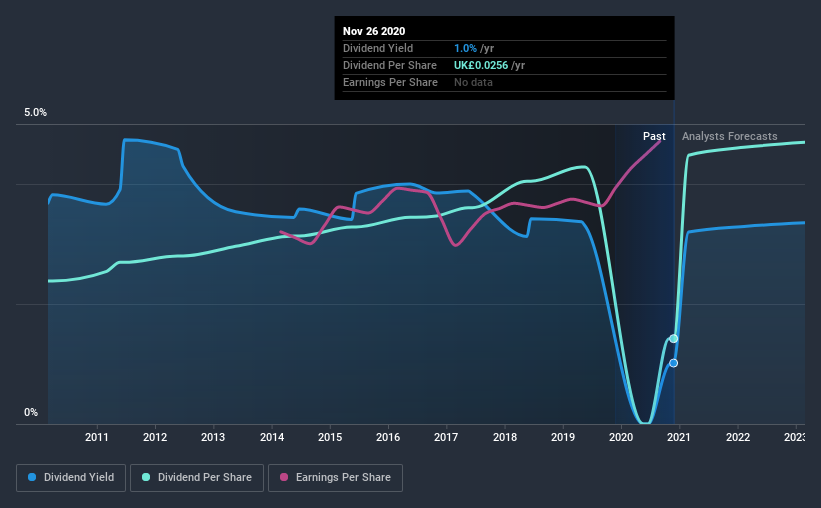- United Kingdom
- /
- Media
- /
- LSE:BMY
Would Bloomsbury Publishing plc (LON:BMY) Be Valuable To Income Investors?

Today we'll take a closer look at Bloomsbury Publishing plc (LON:BMY) from a dividend investor's perspective. Owning a strong business and reinvesting the dividends is widely seen as an attractive way of growing your wealth. Yet sometimes, investors buy a popular dividend stock because of its yield, and then lose money if the company's dividend doesn't live up to expectations.
A 1.0% yield is nothing to get excited about, but investors probably think the long payment history suggests Bloomsbury Publishing has some staying power. Some simple analysis can reduce the risk of holding Bloomsbury Publishing for its dividend, and we'll focus on the most important aspects below.
Explore this interactive chart for our latest analysis on Bloomsbury Publishing!

Payout ratios
Companies (usually) pay dividends out of their earnings. If a company is paying more than it earns, the dividend might have to be cut. Comparing dividend payments to a company's net profit after tax is a simple way of reality-checking whether a dividend is sustainable. In the last year, Bloomsbury Publishing paid out 8.5% of its profit as dividends. Given the low payout ratio, it is hard to envision the dividend coming under threat, barring a catastrophe.
In addition to comparing dividends against profits, we should inspect whether the company generated enough cash to pay its dividend. Bloomsbury Publishing's cash payout ratio last year was 4.4%, which is quite low and suggests that the dividend was thoroughly covered by cash flow. It's positive to see that Bloomsbury Publishing's dividend is covered by both profits and cash flow, since this is generally a sign that the dividend is sustainable, and a lower payout ratio usually suggests a greater margin of safety before the dividend gets cut.
While the above analysis focuses on dividends relative to a company's earnings, we do note Bloomsbury Publishing's strong net cash position, which will let it pay larger dividends for a time, should it choose.
We update our data on Bloomsbury Publishing every 24 hours, so you can always get our latest analysis of its financial health, here.
Dividend Volatility
One of the major risks of relying on dividend income, is the potential for a company to struggle financially and cut its dividend. Not only is your income cut, but the value of your investment declines as well - nasty. For the purpose of this article, we only scrutinise the last decade of Bloomsbury Publishing's dividend payments. This dividend has been unstable, which we define as having been cut one or more times over this time. During the past 10-year period, the first annual payment was UK£0.04 in 2010, compared to UK£0.03 last year. The dividend has shrunk at around 5.0% a year during that period. Bloomsbury Publishing's dividend has been cut sharply at least once, so it hasn't fallen by 5.0% every year, but this is a decent approximation of the long term change.
When a company's per-share dividend falls we question if this reflects poorly on either external business conditions, or the company's capital allocation decisions. Either way, we find it hard to get excited about a company with a declining dividend.
Dividend Growth Potential
Given that dividend payments have been shrinking like a glacier in a warming world, we need to check if there are some bright spots on the horizon. Earnings have grown at around 5.4% a year for the past five years, which is better than seeing them shrink! With a decent amount of growth and a low payout ratio, we think this bodes well for Bloomsbury Publishing's prospects of growing its dividend payments in the future.
We'd also point out that Bloomsbury Publishing issued a meaningful number of new shares in the past year. Trying to grow the dividend when issuing new shares reminds us of the ancient Greek tale of Sisyphus - perpetually pushing a boulder uphill. Companies that consistently issue new shares are often suboptimal from a dividend perspective.
Conclusion
Dividend investors should always want to know if a) a company's dividends are affordable, b) if there is a track record of consistent payments, and c) if the dividend is capable of growing. First, we like that the company's dividend payments appear well covered, although the retained capital also needs to be effectively reinvested. Second, earnings growth has been ordinary, and its history of dividend payments is chequered - having cut its dividend at least once in the past. Overall we think Bloomsbury Publishing is an interesting dividend stock, although it could be better.
Companies possessing a stable dividend policy will likely enjoy greater investor interest than those suffering from a more inconsistent approach. Still, investors need to consider a host of other factors, apart from dividend payments, when analysing a company. For example, we've picked out 1 warning sign for Bloomsbury Publishing that investors should know about before committing capital to this stock.
We have also put together a list of global stocks with a market capitalisation above $1bn and yielding more 3%.
When trading Bloomsbury Publishing or any other investment, use the platform considered by many to be the Professional's Gateway to the Worlds Market, Interactive Brokers. You get the lowest-cost* trading on stocks, options, futures, forex, bonds and funds worldwide from a single integrated account. Promoted
Valuation is complex, but we're here to simplify it.
Discover if Bloomsbury Publishing might be undervalued or overvalued with our detailed analysis, featuring fair value estimates, potential risks, dividends, insider trades, and its financial condition.
Access Free AnalysisThis article by Simply Wall St is general in nature. It does not constitute a recommendation to buy or sell any stock, and does not take account of your objectives, or your financial situation. We aim to bring you long-term focused analysis driven by fundamental data. Note that our analysis may not factor in the latest price-sensitive company announcements or qualitative material. Simply Wall St has no position in any stocks mentioned.
*Interactive Brokers Rated Lowest Cost Broker by StockBrokers.com Annual Online Review 2020
Have feedback on this article? Concerned about the content? Get in touch with us directly. Alternatively, email editorial-team@simplywallst.com.
About LSE:BMY
Bloomsbury Publishing
Bloomsbury Publishing Plc publishes academic, educational, and general fiction and non-fiction books for children, general reader, teachers, students, researchers, libraries, and professionals worldwide.
Solid track record with excellent balance sheet and pays a dividend.

